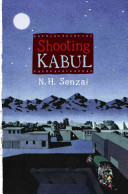by Seems Aziz, Oklahoma State University, Stillwater, OK
MIGRATION: A WAY OF LIFE
 Generally, immigration can be due to many reasons some of which could be due to family/marriage, work/better life or as refugees from war, genocide, and unrest. In the effect of immigration on characters one observes a certain general impact as the characters go through the process of settling in their adopted countries while they usually settle in to a better life while continuing to hold on to their old life. Letting go of who a person has been for a long time is not easy. However, the impact of effects of genocide, war and unrest are ever present in an immigrant’s life and are not easy to shake off.
Generally, immigration can be due to many reasons some of which could be due to family/marriage, work/better life or as refugees from war, genocide, and unrest. In the effect of immigration on characters one observes a certain general impact as the characters go through the process of settling in their adopted countries while they usually settle in to a better life while continuing to hold on to their old life. Letting go of who a person has been for a long time is not easy. However, the impact of effects of genocide, war and unrest are ever present in an immigrant’s life and are not easy to shake off.
As I continue looking into Muslim migration being presented in children’s literature I come across many instances of other related issues that become the crux of the matter like instance that of war, poverty, illiteracy, oppression and last but not least the role and treatment of women in Islam. So one of the strongest trends that I observe in representations of Muslim migrants is that it ignores immigration for reasons of family, marriage, and work and concentrates on war, unrest, poverty, and oppression as reasons for migrating while Western nations are represented as the saviors of these refugees.
Immigration is ages old and has a myriad of impacts. Every migrant reacts in a different manner as they settle into their lives in their adopted countries. It all depends on the reason and way the migration occurred. In Shooting Kabul (N.H. Senzai, 2010) the oppression of Afghani people by the Taliban become the root cause of a family fleeing the country. It is an almost true account of a family’s experiences under the oppressive regime of the Taliban. Fadi’s father is educated in the U.S. and has elected to stay in Afghanistan to help his own people under the initial (good) rule of the Taliban but ‘with great power comes great responsibility’ and Taliban turn evil as they cannot control their power. The family flees in the dead of night but in their hurry lose the youngest member of their family; Mariam, the baby sister. They reach the Western shores of the U.S. and initially stay with family. They then strike out on their own and the PhD holding father becomes a cab driver and the sister works at McDonalds. Fadi, the protagonist, is riddled by guilt, as it is under his care that his sister is lost. He is continuously thinking of ways to go back and search for her.
Then the events of 9/11 unfold. “By the end of the day, Fadi knew that the world as he knew it would never be the same again” (p. 137). The family suffers being Muslims from Afghanistan. Fadi is bullied and beaten in school. People they know disappear and are killed. The views of Muslims are represented through a dialogue between Fadi’s father and mother as the father, Habib, says, “ this is an act against Allah and all of humanity. And there will be retribution” (138). Thus, in the book, the family is again oppressed and the impact of immigration is presented time and again as policies and issues of legality and illegality. So, I ask: is the West the savior of these characters?
One can observe the impact of 9/11 and war on terrorism on Muslims also being represented in Ask Me No Questions (Budhos, 2006)and Guantanamo Boy (Perera, 2010).
Please visit wowlit.org to browse or search our growing database of books, to read one of our two on-line journals, or to learn more about our mission.
- Themes: N.H. Senzai, Seemi Aziz, Shooting Kabul
- Descriptors: Books & Resources, Debates & Trends, WOW Currents

Good article. Normally such complex issues are absent in indian children literature and more especially in Hindi Children’s literature. It would be interesting to read this book and i would certainly like to add it to my personal library. I. myself. am a children’s author and this book would certainly inspire me to touch upon such important subjects which are presently alien in hindi children’s literature. Thanks for this beautiful blog of yours. regards. r.t.